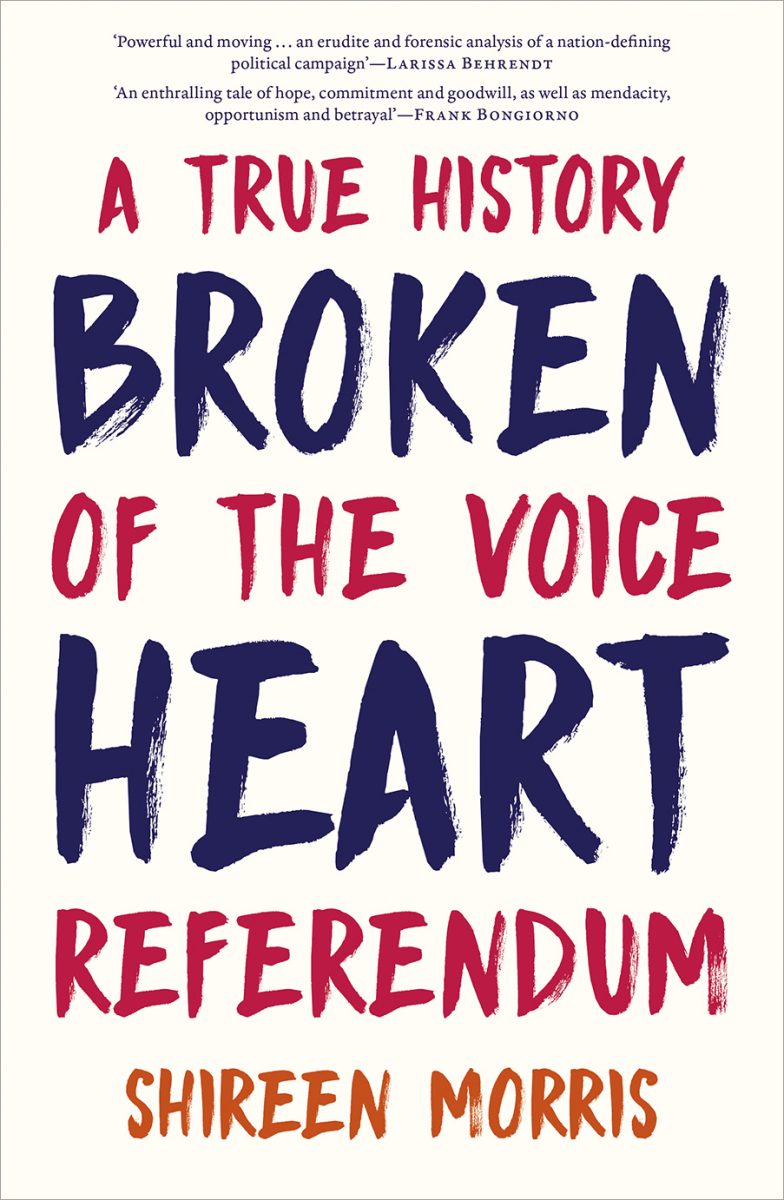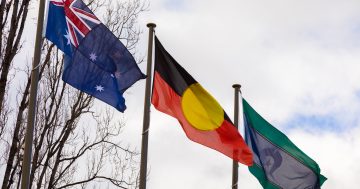
Broken Heart: A True History of the Voice Referendum by Shireen Morris gives a unique insider’s perspective on the story of the 2023 Voice Referendum, from Yes to No. Photo: Supplied.
In a constitutional referendum more than 12 months ago, Australians rejected a proposed Aboriginal and Torres Strait Islander Voice to Parliament. Here now is the inside story of the 2023 Voice Referendum, from Yes to No – told by someone with a privileged insight.
This unique insider perspective comes from Associate Professor at Macquarie University Law School Shireen Morris, who is also the director of its Radical Centre Reform Lab. Morris formerly worked at the Cape York Institute as a senior adviser on Indigenous constitutional recognition.
Told from the first-hand understanding of a constitutional lawyer who worked closely with Aboriginal leader Noel Pearson on the Voice for more than a decade, this book analyses the mistakes of the government and ”Yes” advocates, the fickleness and ultimate intransigence of the right, and the betrayals and lies that led to the referendum’s defeat.
Broken Heart unpacks the true, complex history of the referendum, illuminating how an alliance between Indigenous advocates and constitutional conservatives fractured under political pressure, and a proposal conceived in compromise was killed by partisan politics.
This book is the sequel to Radical Heart, which tells the story of Morris’s initial seven years of work with Mr Pearson on Indigenous constitutional recognition, from 2011 to 2018.
It explains how Indigenous leaders collaborated with constitutional conservatives in 2014 to develop the idea of a constitutionally guaranteed Indigenous advisory body – a concept adopted via an unprecedented consensus of Indigenous people in the Uluru Statement from the Heart in 2017. Radical Heart closes after then-Prime Minister Malcolm Turnbull rejected the Voice proposal in October 2017, “seriously damaging future chances of bipartisanship”.
In this next instalment, Broken Heart zooms out from the present moment. As Morris goes on to explain, “to capture the whole trajectory of the Voice, reanalysing the early years with the benefit of new hindsight, before zooming in on the final years to unpack the history of the failed referendum.
“I felt compelled to write this book because from the moment the voting results started coming in on 14 October 2023 – and throughout the referendum campaign —politicians, advocates and commentators have been trying to rewrite history.
“Pundits called it a ‘no compromise’ referendum. Its failure was the fault of Indigenous leaders and a Labor government that stubbornly refused to negotiate or compromise.”
Morris says the “Australian people got it wrong in the Voice referendum. We chose fear over love. Though voting ‘Yes’ would have cost us little, we fell for nitpicking and division over a chance at reconciliation. That was our right: our collective decision was of course democratically legitimate. But we made a mean and miserly choice …”
Morris admits she occupies a “strange position” – being neither Indigenous nor white. Her ancestors hail from India, via Fiji, and she became a constitutional lawyer and reform advocate whose primary focus for more than 12 years working with Mr Pearson was Indigenous constitutional recognition. As a non-Indigenous advocate for the Voice, she always felt “a tension between being urged, and feeling a responsibility, to speak up in support of the reform Indigenous people requested through the Uluru Statement – the proposal I helped devise – and feeling pressure to stay passive and silent”.
On 14 October, 2023, voters were asked to approve an alteration to the Australian Constitution that would recognise Indigenous Australians in the document by prescribing a body named the Aboriginal and Torres Strait Islander Voice. That body would have been able to make representations to Federal Parliament and the executive government on “matters relating to Aboriginal and Torres Strait Islander peoples”.
The proposal was rejected nationally and by a majority in every state, thus failing to secure the double majority required for amendment by Section 128 of the constitution. The ACT was the only state or territory with a majority of ‘’yes’’ votes. Following the referendum, an analysis of surveys identified the main reasons the majority of Australians voted ‘’no’’ was a scepticism of rights for some Australians that are not held by others and a fear of constitutional change.
Even though Broken Heart is a story of hope, tragedy and defeat, we are urged not to feel disheartened, but instead to be energised. It challenges Australia’s next generation to come up with new solutions where previous generations have failed. To develop better ideas and strategies to make our country fairer and heal history’s wounds. It is these lessons that will assist future reformers and leaders who want to make Australia a better place.
Broken Heart: A True History of the Voice Referendum, by Shireen Morris, La Trobe University Press, $36.99



